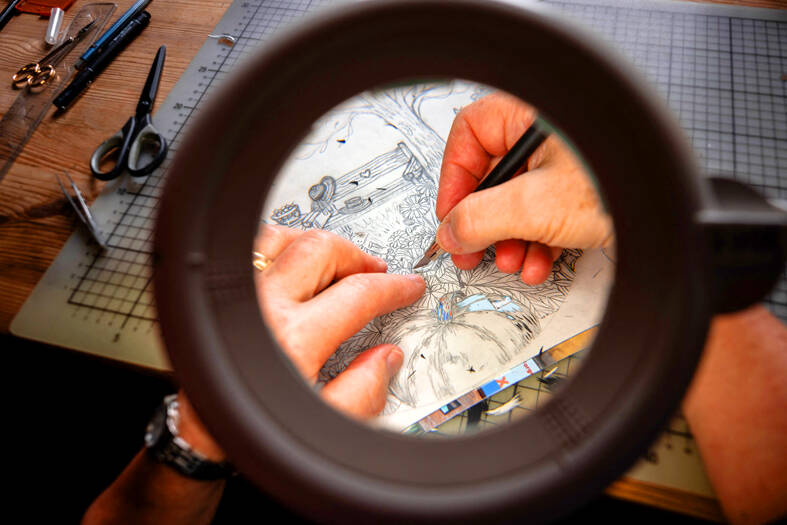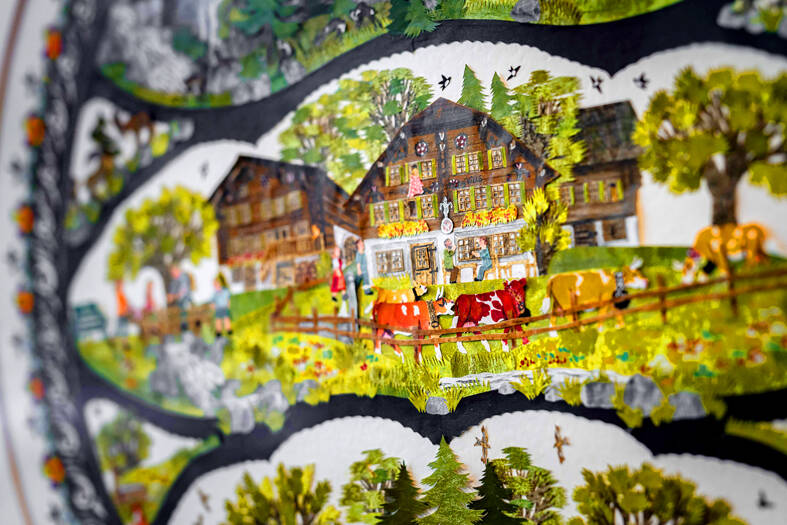Marianne Dubuis stared intently through a magnifying glass, using a slim cutter to make tiny incisions in paper as she carved out delicate tableaux of life and human emotions.
The 64-year-old designer is reinventing the Swiss traditional art of paper cutting, which typically shows Alpine landscapes and cows heading to mountain pastures, by infusing a large dose of poetry and modernity.
Dubuis, a florist by training, said that she has devoted herself to paper cutting since childhood and now spends about six hours a day on her passion.

Photo: AFP
At her home studio in Chateau d’Oex, in the Pays-d’Enhaut area where the Swiss tradition was born about 200 years ago, she showed off her craft, using scissors or a cutter to carve out intricate scenes inspired by the surrounding woods and the people she meets.
The works, either in black and white or in color, have been shown in Switzerland, France, Germany and Japan.
Some of them, more than 1m high, are on display until Sept. 6 at the new Swiss Paper Cutting Center in Chateau d’Oex, a picturesque village in the pre-Alps of western Switzerland.

Photo: AFP
“I am very proud of paper cutting, and what it represents of Switzerland. It is a way of representing our values, our roots,” she said.
However, “if we keep doing the same things over and over, the tradition dies,” said Dubuis, who wants to reinvent the art form in her own way.
Paper cutting originated in Asia and spread to Europe around the 17th century.
Johann-Jakob Hauswirth, a farm worker who died in poverty in the 19th century, is considered the father of the art form in Switzerland.
When the opportunity arose, he took his scissors to scraps of paper and began creating naive representations of Alpine scenes, and the annual poya ritual of driving cows up the mountain to graze. He would then leave them as a thank-you gift after a meal.
His works, as well as the more numerous creations of other masters in the field, such as Louis Saugy and Christian Schwitzguebel, sell at auction for “several tens of thousands of francs [US dollars],” said Emmanuel Bailly, of the auction house Beurret & Bailly Auktionen.
Close to nature, Dubuis draws her inspiration from the forest.
Her cuttings, some of which likewise sell for tens of thousands of francs, reflect her emotions and also tell a life story, like a biography in carved paper.
“When I have a private commission, they come and tell me about their life,” she said. “I put in what I feel about this person; the essence of what they told me.”
This approach has brought comfort, help and relief, she said, citing a work created for a father who lost his son, or one for a couple on the verge of splitting up, but who thought again after seeing the cutting representing the journey of their years together.
With Dubuis’ work, “there is something spiritual,” said Monique Buri, vice president of the Swiss Paper Cutting Association, which has about 500 members.
Dubuis weaves in modernity with tradition to carve out images of Switzerland today.
At the end of 2021, she created a 50cm2 work representing historical heroes like William Tell, as well as chocolate, mountain rescue helicopters or the international organizations based in the country, such as the UN and the Red Cross.
“It’s very nice to make little cows and chamois, but it’s also very interesting to cut out other things,” said Pierre Mottier, head of the association running the museum that houses the Swiss Paper Cutting Center.
Modernity also has its dangers, with an increasing number of companies making cuttings with lasers.
However, Dubuis says she is not worried.
With laser machines, “the soul is missing,” she said.

A Chinese scientist was arrested while arriving in the US at Detroit airport, the second case in days involving the alleged smuggling of biological material, authorities said on Monday. The scientist is accused of shipping biological material months ago to staff at a laboratory at the University of Michigan. The FBI, in a court filing, described it as material related to certain worms and requires a government permit. “The guidelines for importing biological materials into the US for research purposes are stringent, but clear, and actions like this undermine the legitimate work of other visiting scholars,” said John Nowak, who leads field

Brazil, the world’s largest Roman Catholic country, saw its Catholic population decline further in 2022, while evangelical Christians and those with no religion continued to rise, census data released on Friday by the Brazilian Institute of Geography and Statistics (IBGE) showed. The census indicated that Brazil had 100.2 million Roman Catholics in 2022, accounting for 56.7 percent of the population, down from 65.1 percent or 105.4 million recorded in the 2010 census. Meanwhile, the share of evangelical Christians rose to 26.9 percent last year, up from 21.6 percent in 2010, adding 12 million followers to reach 47.4 million — the highest figure

Swedish campaigner Greta Thunberg was deported from Israel yesterday, the Israeli Ministry of Foreign Affairs said, the day after the Israeli navy prevented her and a group of fellow pro-Palestinian activists from sailing to Gaza. Thunberg, 22, was put on a flight to France, the ministry said, adding that she would travel on to Sweden from there. Three other people who had been aboard the charity vessel also agreed to immediate repatriation. Eight other crew members are contesting their deportation order, Israeli rights group Adalah, which advised them, said in a statement. They are being held at a detention center ahead of a

‘THE RED LINE’: Colombian President Gustavo Petro promised a thorough probe into the attack on the senator, who had announced his presidential bid in March Colombian Senator Miguel Uribe Turbay, a possible candidate in the country’s presidential election next year, was shot and wounded at a campaign rally in Bogota on Saturday, authorities said. His conservative Democratic Center party released a statement calling it “an unacceptable act of violence.” The attack took place in a park in the Fontibon neighborhood when armed assailants shot him from behind, said the right-wing Democratic Center, which was the party of former Colombian president Alvaro Uribe. The men are not related. Images circulating on social media showed Uribe Turbay, 39, covered in blood being held by several people. The Santa Fe Foundation